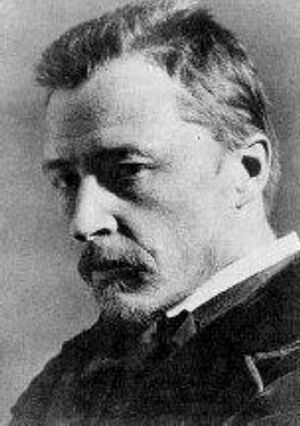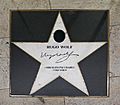Hugo Wolf facts for kids
Hugo Wolf (pronounced "Hoo-go Volf") was an Austrian composer born in Windischgraz (now Slovenj Gradec, Slovenia) on March 13, 1860. He passed away in Vienna on February 22, 1903. Wolf is most famous for his Lieder, which are German art songs. He found new and exciting ways to express poetry through music.
He built on the song styles created by composers like Schubert and Schumann. However, Wolf added his own unique and modern harmonies to German songs. He really loved the music of Richard Wagner, and Wagner's style influenced his own music. Wolf is considered a composer from the late Romantic period.
While he wrote other types of music, his Lieder are his most well-known works. The only other piece of his that is often played today is his Italian Serenade.
Sometimes, Wolf worked incredibly hard and composed a lot of music. At other times, he felt very sad and struggled with depression. Towards the end of his life, he became very ill and needed special care in a hospital.
Contents
Life
Young Hugo: A Musical Start (1860-1887)
Hugo Wolf was born in a town that is now called Slovenj Gradec in Slovenia. Back then, it was part of the Austrian Empire. He was a child prodigy, meaning he was very talented from a young age. When he was four, his father taught him to play the piano and violin.
At school, music was the only subject that truly interested him. He changed schools several times but still focused mostly on music. Later, he went to Vienna to study at the Vienna Conservatory. His father didn't want him to become a musician. Wolf was asked to leave the Conservatory because he didn't follow the rules. He later said he left because he didn't like the old-fashioned way they taught music.
After spending eight months with his family, Wolf returned to Vienna to teach music. He had a strong temper, which sometimes made him a difficult teacher. However, he found some wealthy people who believed in his talent. They paid him money so he would have time to compose.
One of his rich supporters had a daughter named Vally. Wolf fell in love with her, and he was very sad when she left him after three years. He also didn't get along well with his own family. His father thought he wasn't trying hard enough to earn a living. Wolf then got a job as a second Kapellmeister (a music director) in Salzburg. But he wasn't a good conductor, so he soon left that job and went back to Vienna to teach.
Wolf was fascinated by Wagner's music. He even tried to get Wagner's attention once, running after his carriage and asking him to listen to his music. He was very sad when Wagner died. Wolf wrote a song called "Zur Ruh, zur Ruh" ("To rest, to rest"), which is one of his best early pieces. He felt very depressed because Wagner was gone and he felt he had no one to inspire him.
The famous composer Franz Liszt became interested in Wolf. Liszt told him he should try to write some longer pieces. Wolf then wrote a symphonic poem (a long orchestral piece that tells a story) called Penthesilea. Wolf also became a music critic, writing reviews about new music. He liked Liszt's music but strongly disliked the music of other composers like Anton Rubinstein and Johannes Brahms. He made many enemies because of the harsh things he wrote about them. People even called him "Wild Wolf." He composed several works but couldn't get them performed. He had been very critical of the famous Rosé Quartet, so they refused to play his music.
In 1887, he stopped writing music criticism and started composing again. He wrote songs based on poems by Goethe and Joseph von Eichendorff. He also wrote an orchestral piece called Italian Serenade, which is one of his best works besides his Lieder. Then his father died, and he didn't compose for the rest of that year.
Becoming Famous: The Song Years (1888-1896)
Hugo Wolf composed a huge amount of music during 1888 and 1889. He stayed with friends outside Vienna and wrote many songs using poetry by Mörike. He then stayed with other friends and composed music for poems by Eichendorff. After that, he wrote 51 Goethe songs, followed by the Spanisches Liederbuch (Spanish Song Book).
Wolf quickly became very famous. His songs received excellent reviews, though not everyone was enthusiastic. Brahms, for example, wrote negative things about Wolf because Wolf had written negative things about Brahms.
By 1891, Wolf was exhausted. He didn't compose anything for several years, but his fame continued to grow. Even Brahms eventually changed his mind and wrote good reviews of Wolf's music.
Composers were often expected to write large pieces like symphonies and operas to be taken seriously. Wolf was given the words for an opera called Der Corregidor. At first, he didn't want to use it because the libretto (the text of an opera) wasn't very good. But then he decided to write the opera. However, even though it was performed, it never became a success.
Final Years (1897-1903)
Wolf's last public appearance at a concert was in February 1897. Soon after, he became very ill and needed to be cared for in a hospital. A lady named Melanie, whom he had loved, visited him faithfully during his last years until his death on February 22, 1903.
Hugo Wolf is buried in the Zentralfriedhof (Central Cemetery) in Vienna. Many other great composers are also buried there.
Music
Wolf's true genius is found in his Lieder (German art songs). Even though he sometimes tried to write larger musical works, his real talent was in creating these shorter pieces. He had a wonderful understanding of poetry, and he expressed it beautifully in many ways:
- Through his late-Romantic harmonies, which often used many chromatic (colorful) notes.
- In the very original way he wrote the piano parts that went along with the singing.
- In the clever way he grouped his songs together with connecting themes.
His most famous collections of songs include Mörike-Lieder (1888), Eichendorff-Lieder (1889), Goethe-Lieder (1890), Spanisches Liederbuch (1891), Italienisches Liederbuch (1892, 1896), and Michelangelo Lieder (1897).
Wolf wrote hundreds of Lieder, three operas, incidental music (music for plays), choral music (for choirs), and some orchestral, chamber (for small groups of instruments), and piano music that is rarely heard today. His most famous instrumental piece is the Italian Serenade (1887), which was originally for a string quartet (four string instruments) and later arranged for an orchestra.
Images for kids
See also
 In Spanish: Hugo Wolf para niños
In Spanish: Hugo Wolf para niños
 | Percy Lavon Julian |
 | Katherine Johnson |
 | George Washington Carver |
 | Annie Easley |




